Hang Muscle Snatch Exercise: How To, Benefits & Variations
Author:
Unlock your full potential by engaging with our experts and community! Have questions about your fitness journey or looking for expert advice on weightlifting techniques? Don’t hesitate — leave a comment below and Oleksiy Torokhtiy will provide a personalized answer and insights to help you reach your goals.
Torokhtiy is reader-supported. Some links are affiliate links, and we may earn a commission at no extra cost to you. See our disclosure page for details.
If you have even a teensy bit of interest in strength training, there’s no way you haven’t heard of the hang muscle snatch. You might even think it’s complicated, but it’s simpler than, say, the snatch, but still powerful enough that it can do a lot in terms of strength, power, and performance.
It’s an exercise that engages your whole body, but it pays special attention to your shoulders, back, and core. It can build muscle, improve coordination and explosiveness, plus it’s a fantastic way to make your workout routine feel fun and fresh again.
Wanna know how to do it, what benefits you can expect, mistakes to look out for, etc.? Keep reading!
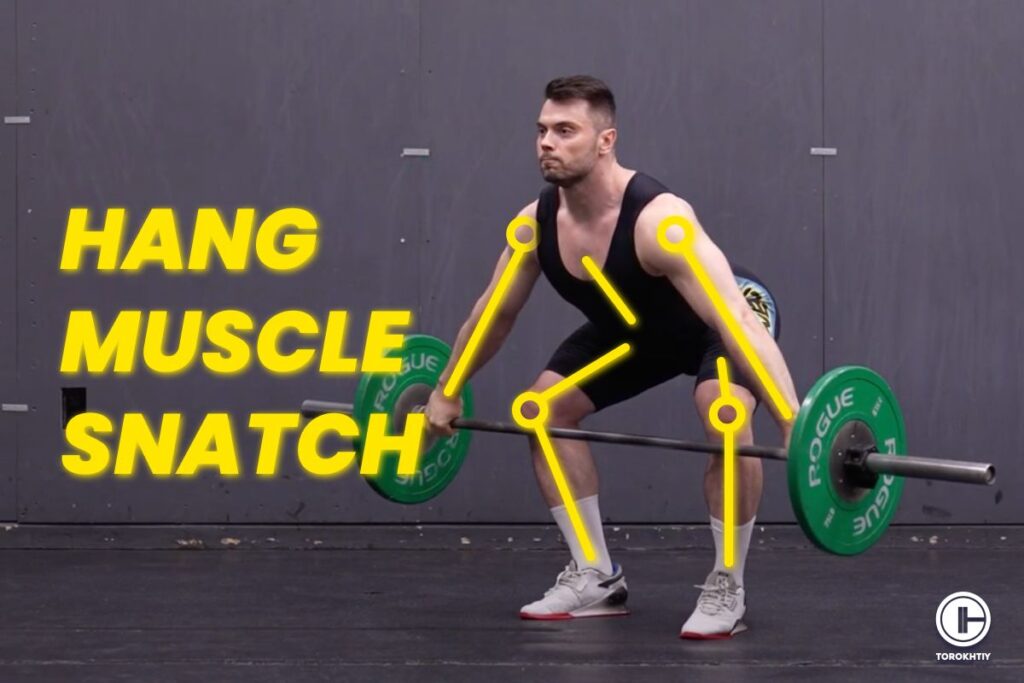
What Is the Hang Muscle Snatch?
The hang muscle snatch is a weightlifting exercise that focuses on strength, power, and coordination.
You might mistake it for the traditional snatch, where you start with the barbell being on the floor, but you start this one standing up and holding a barbell above the floor. It’s easier to learn and it’s far less intimidating for beginners.
The goal is to lift the barbell overhead in one smooth, explosive motion. It works your back, core, and legs, so you get a full-body workout. There’s a ton of benefits to it, but we’ll get to that a little later.
How to Do the Hang Muscle Snatch?
This exercise needs a lot of precision and technique, so let’s see how to do it properly.
1. Starting Position
If you don’t start correctly, the rest of the lift will be messed up, so pay attention to how you position yourself.
Stand tall with feet hip-width apart (directly under your hips). This is your base for the lift. Use a wide, hook grip, with palms facing towards you and the knuckles being down. Hold the barbell at your thighs and keep your arms straight.
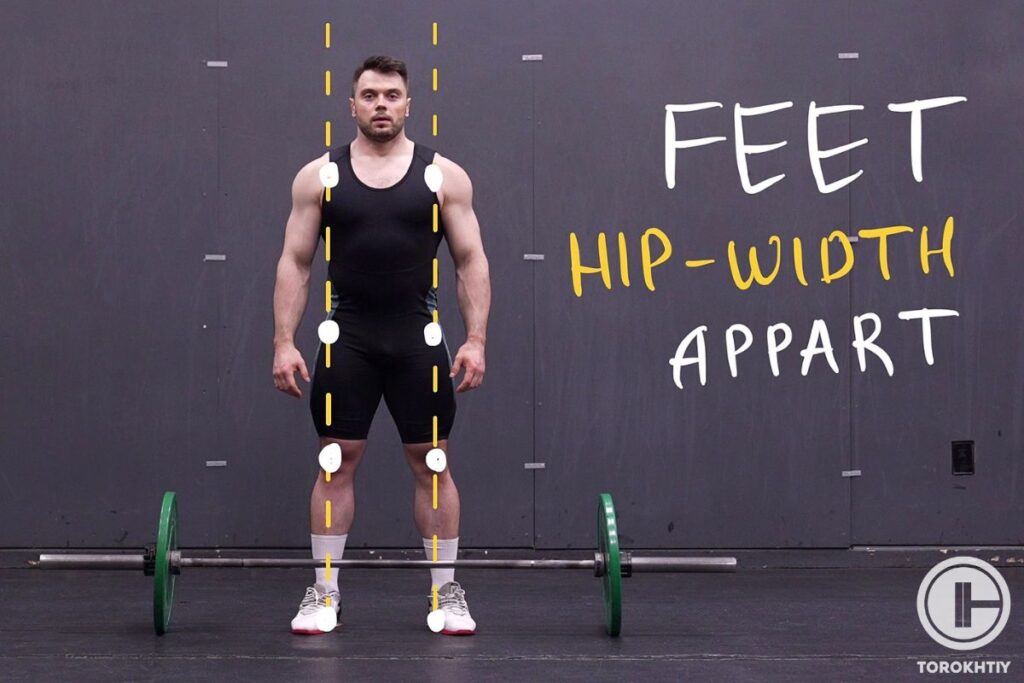
2. Engage Your Core
Pretend someone is just about to punch you in the stomach and tighten your abs like you would in that situation. This will protect your lower back and give you stability.
Your back should be flat and your chest needs to be up, with shoulder blades pulled back and down.
3. Lower to the Hang Position
Push your hips back a little and bend your knees slightly. The bar should be below or above your knees (depending on the variation) and the weight should be balanced on the mid-foot, not the toes.
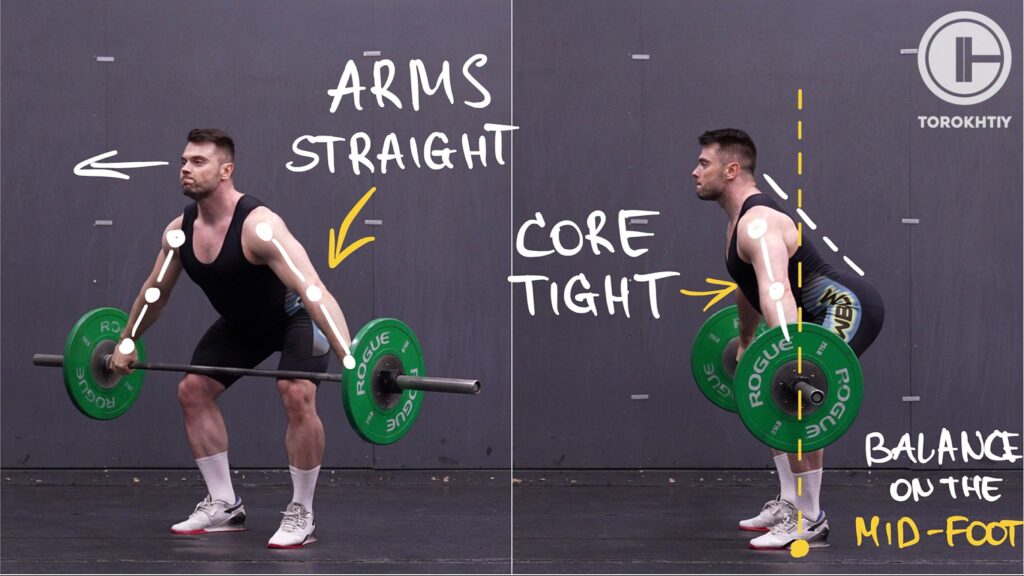
4. Second Pull and Power Position
Push through your midfoot and explosively extend your hips and knees and ankles – triple extension. You want to generate power from your lower body. As you reach power position (the last moment after pull when the bar is in contact with your legs), use your traps and arms to pull the bar up while keeping the bar close to the body.
5. Turnover and Catch
As the bar reaches its peak height, quickly rotate your elbows and wrists to turn under the bar and punch/press the bar up. Catch the bar overhead with your arms fully extended and your shoulders engaged.
Make sure your core is tight and your back is straight to maintain stability. You should finish with the barbell securely overhead.
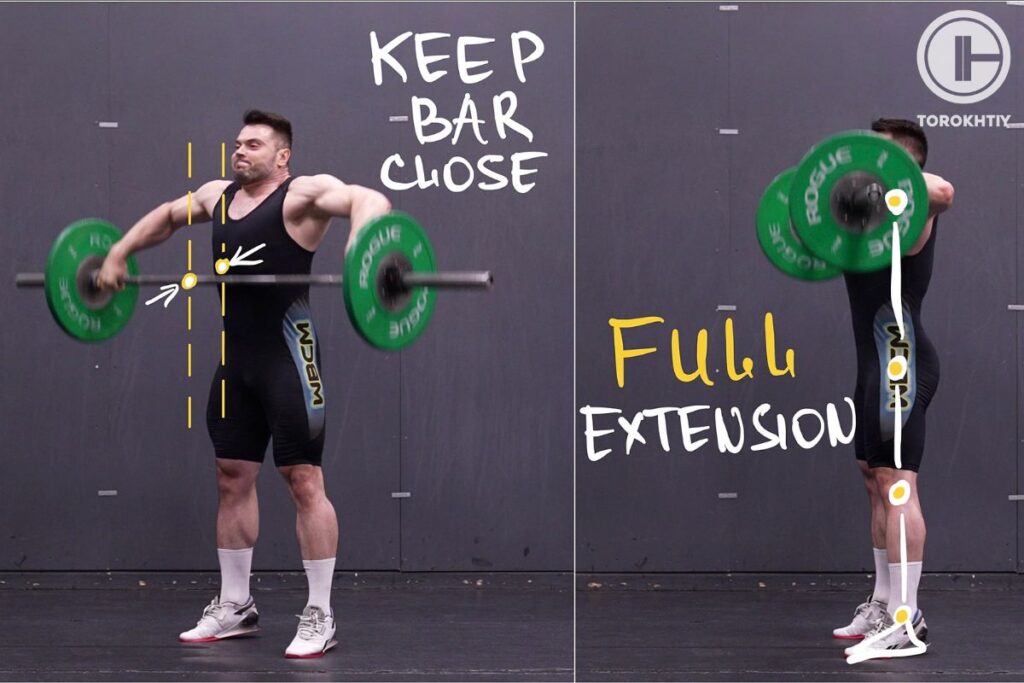
6. Stabilize
Once you’ve caught the bar overhead, keep that stable position for a moment to make sure you’re balanced and the barbell is under control before you lower it down.
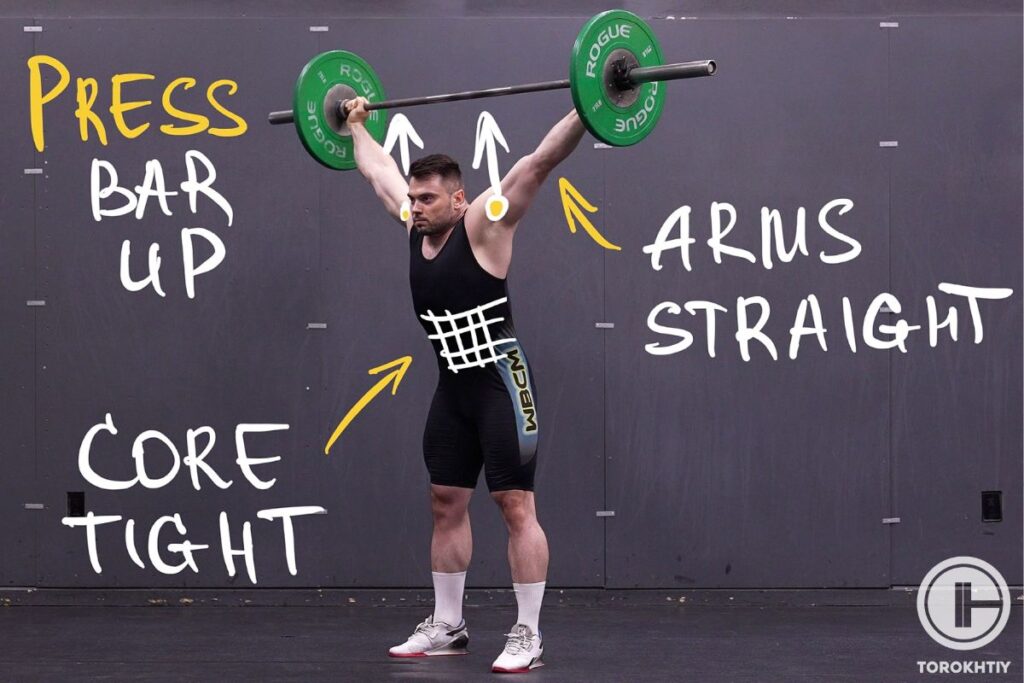
7. Lower the Barbell
Carefully lower the barbell back to thigh level. Don’t drop it or let it crash down.
Congrats! Your first hang muscle snatch is done!
Save it for easy access!
Bookmark this page now to access the program and instructional videos anytime, anywhere.
Stop wasting time searching during your gym sessions.
Detailed Hang Muscle Snatch Program
If you already have a set routine, it can be tricky to include new exercises in it. Lucky for you, you have us to help you out!
| Level | Reps | Sets | Frequency |
|---|---|---|---|
| Beginner | 3-5 | 3-4 | 2 times per week |
| Intermediate | 3-4 | 4-5 | 2-3 times per week |
| Advanced | 1-3 | 5-6 | 2-3 times per week |
Beginner
- Reps: 3-5 per set
- Sets: 3-4 sets
- Frequency: 2 times per week
- Progression: Mastering form and technique is your priority, so either use just a bar with no weights or use really light weights. Ask a coach for help or video yourself to check the form. Increase the weight in small increments as you get stronger and more proficient.
Intermediate
- Reps: 3-4 per set
- Sets: 4-5 sets
- Frequency: 2 times per week
- Progression: Include variations like the hang power snatch to add variety and extra challenge. Start using heavier weights (challenging, but still manageable so you don’t mess up your form) and focus on speed and explosiveness in each rep. Pay attention to bar path and body positioning.
Advanced
- Reps: 1-3 per set
- Sets: 5-6 sets
- Frequency: 2-3 times per week
- Progression: Include the hang snatch into a well-rounded Olympic lifting program and use near-max weights to push your limits. Include hang muscle snatch into your olympic weightlifting complexes.
Follow us!
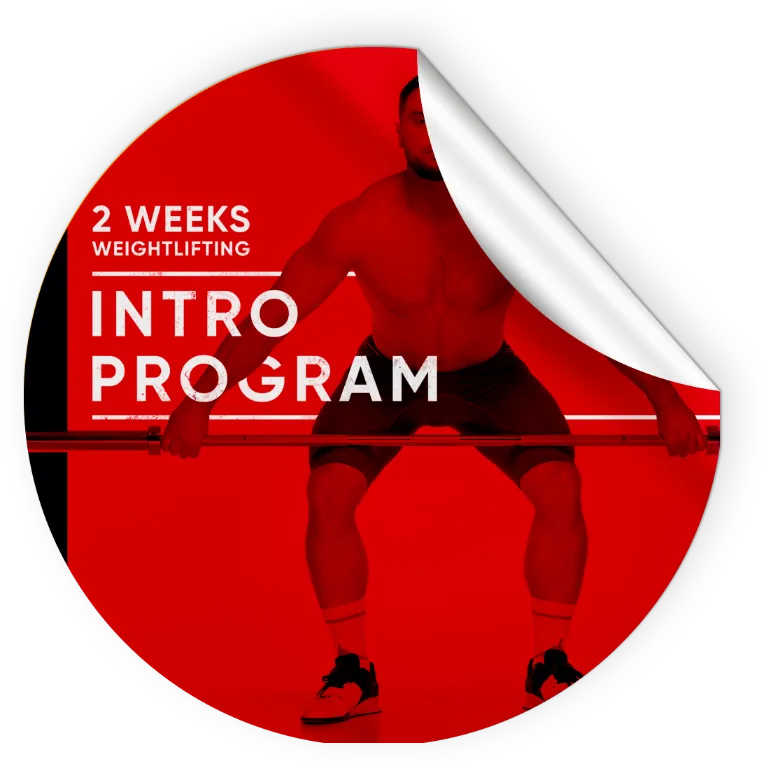
Free!
Get a 2-week Weightlifting Program as a bonus for the subscription to kickstart your training plan!

Free!
3 Common Hang Muscle Snatch Mistakes
You shouldn’t drive yourself crazy trying to avoid making mistakes because they’ll happen either way. Still, it’s good to be aware of them so you can make them less frequently.
❌ Rounding Your Back
When you round your back too much, you put a lot of stress on your spine and the lift ends up being a waste of your time because you don’t get much out of it. Good form keeps you safe and makes the exercise effective, so pay attention to your stance.
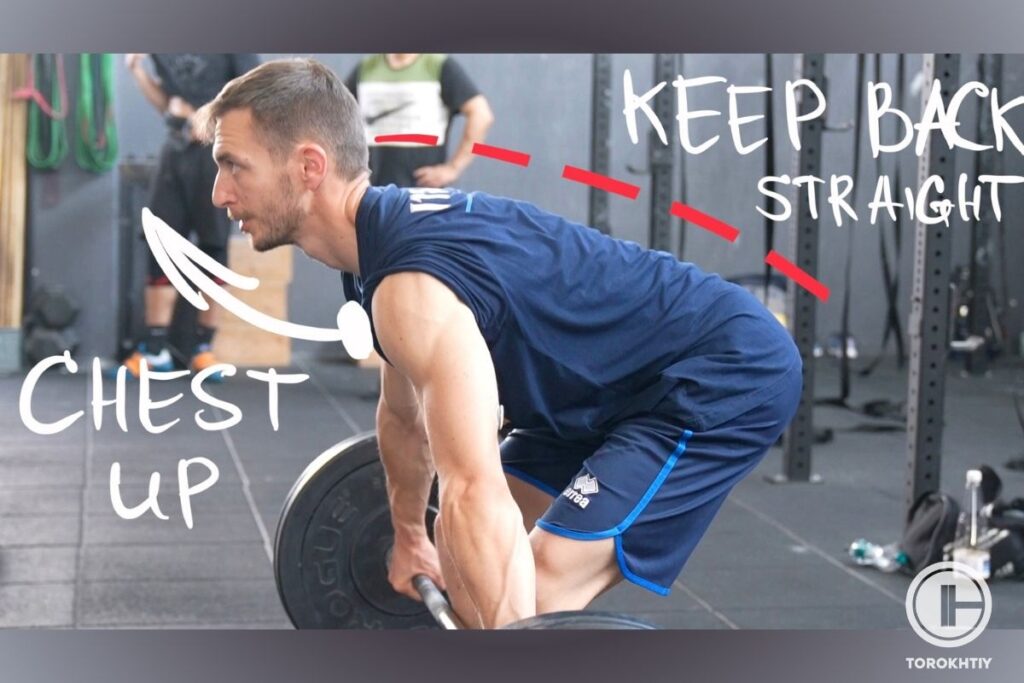
❌ Too Much Arm Power
Don’t rely on your arms to lift the barbell – that’s what your legs and hips are for. If you use your arms too much, it will lead to poor form.
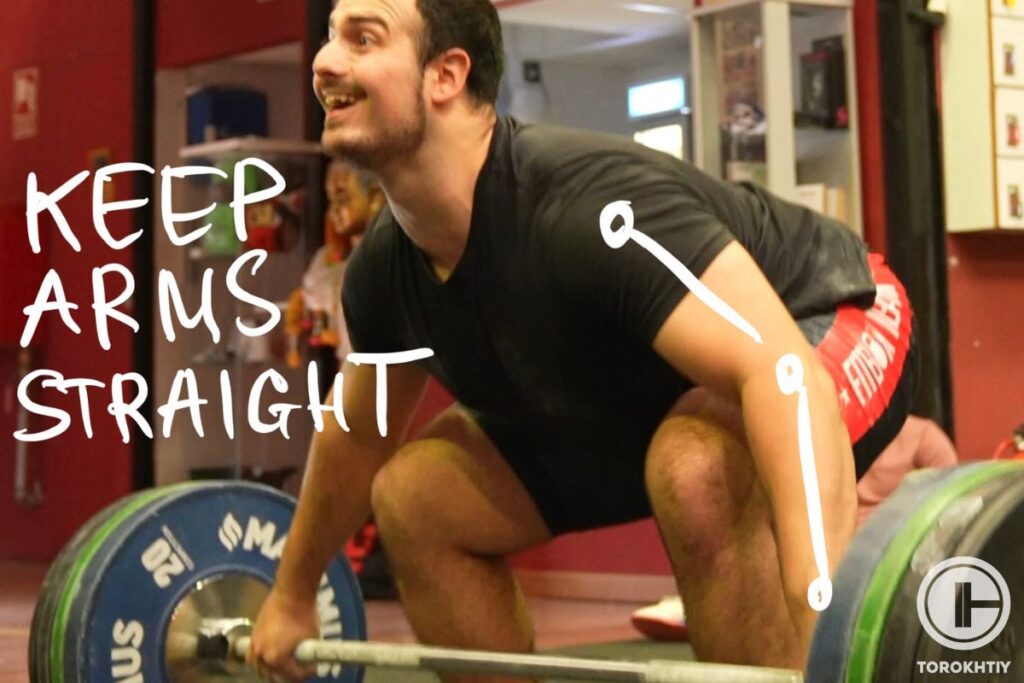
❌ Poor Timing
Make sure to synchronize the extension of your hips and the pull with your arms. Timing is a big deal and you should always extend your hips simultaneously with the pull of your arms.
4 Benefits of Hang Muscle Snatch
Apart from looking cool at the gym and showing off, there are some other, more impressive benefits!
✅ Full-Body Workout
This is a time-effective workout because it can build strength or muscle endurance in your entire body.
✅ Better Coordination & Balance
This exercise needs precise coordination between your upper and lower body, so when you practice it on a regular basis, it will improve your motor skills, balance, and body control in general.
Tips From the Champ
If your goal is refining technique in arms work, the hang muscle snatch is my go-to. It forces to stay sharp with the bar path and timing, helping to smooth out turnover and build better control. Plus, it’s a great drill for strengthening shoulders and improving that smooth transition overhead.
Olympic Weightlifting Champion
✅ Develops Explosive Power
The hang muscle snatch relies on the explosive triple extension so, if you keep practicing, your explosive power will improve. This is especially important for athletes.
✅ Bone Density
Weight-bearing exercises will improve your bone density, and the hang muscle snatch is one of them. The load on your skeleton stimulates bone tissue growth, helps prevent osteoporosis and keeps your bones strong and healthy.
2 Hang Muscle Snatch Variations
What’s a better way to spice things up than to include some variations in your session?
1. Low Hang Muscle Snatch
You do it the same way you would the hang muscle snatch, but you start with the barbell just below the knees. This variation improves explosive power and strength from a lower starting position and puts more emphasis on rate of force in lower position.
2. High Hang Muscle Snatch
This one starts with the barbell at mid-thigh level and it focuses more on the second pull of the snatch. It improves coordination, balance, and strength in your upper body. It’s especially useful for working on the speed of turnover phase of the snatch.
3 Hang Muscle Snatch Alternatives
If you want the same/similar benefits but different exercise, we have a few fantastic options!
1. Muscle Clean
You lift the barbell off the floor to your shoulders in one explosive movement and it’s an excellent way to build explosiveness and strength in your entire body.
2. Push Press
In this one, you dip a little at the knees and use your legs to help press the barbell overhead. This targets your shoulders, triceps, and upper chest but it also engages your core and lower body.
3. Kettlebell Snatch/Clean
This is a dynamic exercise that focuses on the hip hinge movement. It strengthens your glutes, hamstrings, and lower back. It also improves your cardiovascular fitness. Great think about it – it can be done with one or two kettlebells.
4. Hang Muscle Snatch with Dumbbells
It’s simple – just use dumbbells instead of the barbell. It will improve unilateral strength and handle muscle imbalances, which can lead to injuries.
5. Hang Power Snatch
With this one, you catch the barbell in a partial squat position and it focuses more on the explosive power. It’s great if you want to improve your rate of force development and speed.
6. Hang Snatch Pull
For this one, you pull the barbell explosively from the hang position to just above your hips or to your chest height without turnover. It emphasizes the power and strength of your lower body.
Who Should Do the Hang Muscle Snatch?
This is one of those exercises that are beneficial for just about anyone!
1. Athletes
Athletes like basketball and football players will love the hang muscle snatch because it improves explosive power, speed, and coordination – everything they need for the best possible performance.
2. Weightlifters
Of course – weightlifters. Duh! It’s an essential exercise for anyone in Olympic lifting or powerlifting because it refines technique, improves strength and endurance, and improves performance overall.
3. Fitness Enthusiasts
The hang muscle snatch is a great choice for anyone passionate about fitness because it’s a full-body workout that will tone the muscles and help break through plateaus.
4. Older Adults
Bones tend to lose their strength and density as we age, so if you want to work on that, the hang muscle snatch can help. Apart from being great for your bones, it also can improve muscle mass, coordination, and balance.
Muscles Worked By the Hang Muscle Snatch
As far as exercises go, this one is a powerhouse because it works many muscle groups at the same time. Your shoulders (especially the deltoids) are super engaged when you lift the bar over your head. The back muscles stabilize and support the lift, while the core helps you stay balanced.
Your legs and hips generate the power you need for the movement, and your forearms and grip work to control the barbell.
Conclusion
If you’re still hanging in there, that’s great because you now know all there is to know about the hang muscle snatch. It’s an excellent full-body workout that will develop your explosive power, improve balance and coordination, and promote bone density. And, hey, if you ever get bored of it – there are variations and alternatives to try!
Remember – form and technique come first, you can’t lift heavy before you master the basics.
Is there anyone that’s already tried it? If there is, what do you like most about it? Are there any issues you’ve encountered?
Drop a comment and go lift!
Also Read:
- Muscle Snatch vs Power Snatch vs Snatch
- Muscle Snatch
- Snatch Deadlift
- Snatch Exercise
- Hang Snatch High Pull
- Hang Snatch
- Power Snatch
References:
- Health Promotion Board (HPB) “Prevent Injuries with Proper Form During Workouts,” Singapore University Health Center, https://www.nus.edu.sg/uhc/articles/details/prevent-injuries-with-proper-form-during-workouts (accessed June 12th, 2024)
- Mayo Clinic Staff, “Weight training: Do’s and don’ts of proper technique,” Mayo Clinic, https://www.mayoclinic.org/healthy-lifestyle/fitness/in-depth/weight-training/art-20045842 (accessed June 12th, 2024)
- “Prevention Osteoporosis,” National Health Service, https://www.nhs.uk/conditions/osteoporosis/prevention/ (accessed June 12th,2024)
- “Slowing bone loss with weight-bearing exercise,” Harvard Health Publishing, https://www.health.harvard.edu/staying-healthy/slowing-bone-loss-with-weight-bearing-exercise (accessed June 12th, 2024)5. Venkat S. R. “What Are Muscle Imbalances?” WebMD, https://www.webmd.com/fitness-exercise/what-are-muscle-imbalances (accessed June 12th, 2024)
- Photos by Torokhtiy Media Team.
Why Trust Us?
With over 20 years in Olympic weightlifting, strength training, nutrition coaching, and general fitness our team does its best to provide the audience with ultimate support and meet the needs and requirements of advanced athletes and professional lifters, as well as people who strive to open new opportunities and develop their physical capabilities with us.
By trusting the recommendations of our certified experts in coaching, nutrition, and sports training programming, as well as scientific consultants, and physiotherapists, we provide you with thorough, well-considered, and scientifically proven content. All the information given in the articles concerning workout programming, separate exercises, and athletic performance, in general, is based on verified data.
The product testing process is described in more detail here.
Author: Oleksiy Torokhtiy
Olympic Weightlifting Champion
Best Results: Snatch – 200 kg,
C&J – 240 kg
Oleksiy Torokhtiy is a professional athlete boasting 20 years of experience in Olympic weightlifting. With multiple European and World titles under his belt, he has showcased his prowess in two Olympic Games (Beijing 2008 and London 2012). Upon concluding his illustrious career, Oleksiy dedicated himself to coaching. By 2022, he had conducted over 200 weightlifting seminars worldwide. He is the visionary behind an international sportswear and accessories brand known for its motto, “Warm Body Cold Mind.” Additionally, he is an esteemed author and the creator of a series of training programs and eBooks.

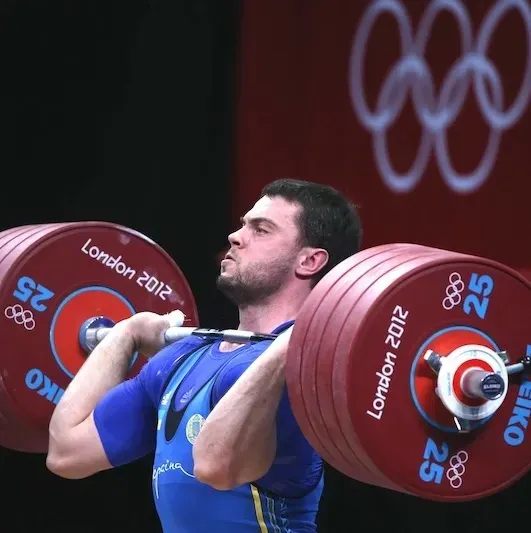


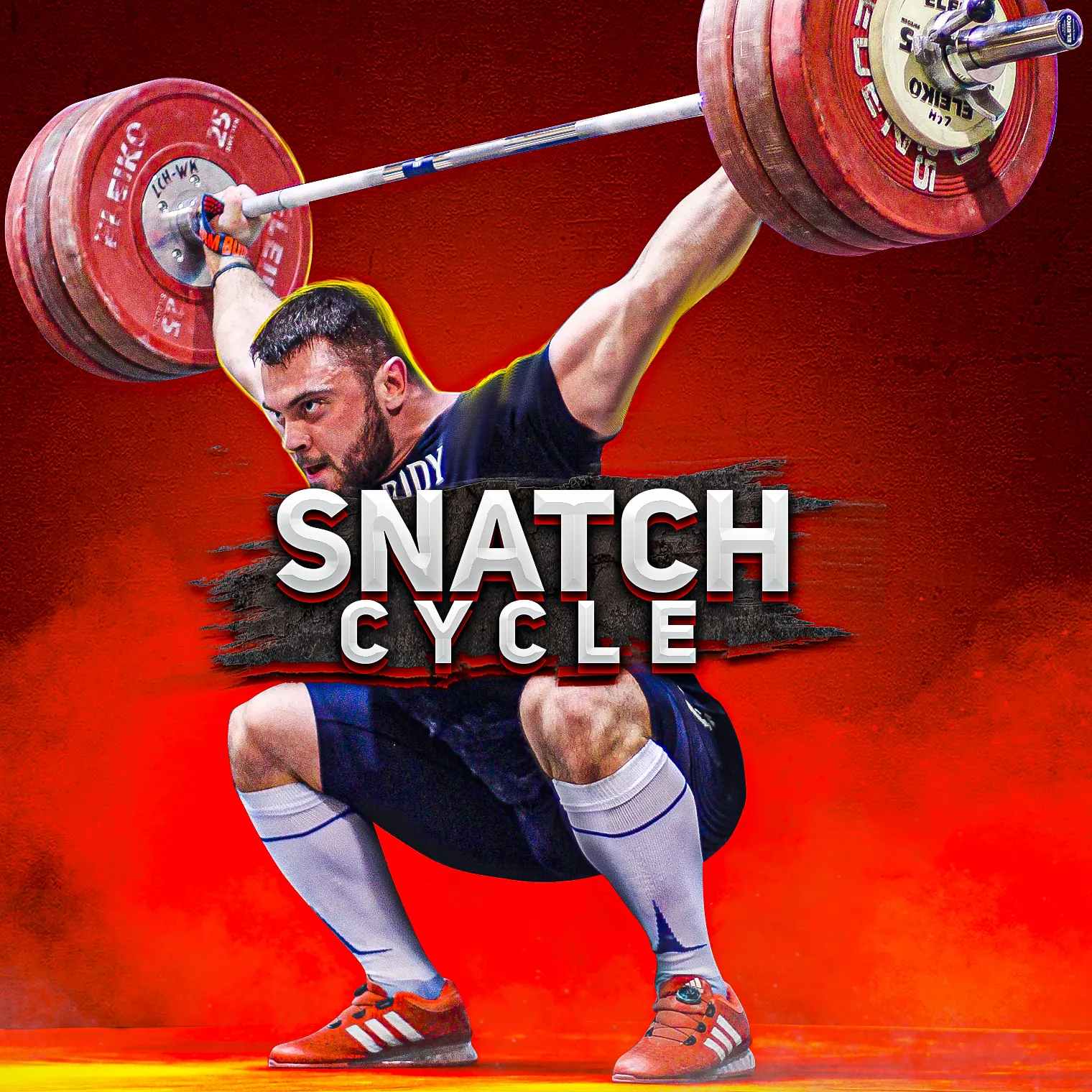
Still have questions after reading our article? Unlock your full potential by engaging with our experts and community! Don’t hesitate — leave a comment below and Oleksiy Torokhtiy will provide a personalized answer and insights to help you reach your goals.